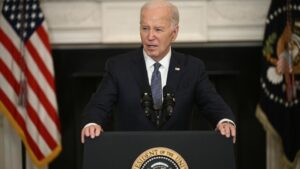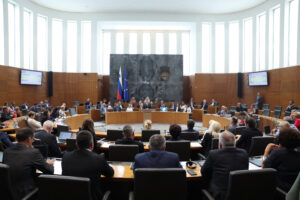
The National Interest Foundation Newsletter
Issue 239, June 7, 2024
Welcome to our NIF Newsletter. In this week’s edition, we delve into U.S. President Biden unveiling a Gaza War ceasefire proposal which mirrors past ones, analyze the array of 2024 elections that have been mired in American Israel Public Affairs Committee (AIPAC) money, examine how the United States is slowing down the export of artificial intelligence (AI) chips to the Middle East over national security concerns, and discuss Slovenia becoming the latest European country to recognize a Palestinian state.
President Biden Unveils Gaza War Ceasefire Proposal Which Mirrors Past Ones

Amid the ongoing push for a ceasefire deal, Israel has intensified its military offensive. (Photo from AFP)
President Biden Unveils Gaza War Ceasefire Proposal Which Mirrors Past Ones
U.S. President Joe Biden addressed the American public last Friday, providing what he called “A roadmap to an enduring ceasefire.” The three-part proposal comes on the heels of Israel’s universally criticized military operation in Rafah, further emphasizing the need for an end to the conflict. In his remarks, Biden outlined the plan, stating that phase one would last six weeks and entailed a complete ceasefire during which the Israeli military would withdraw from the populated areas of Gaza, hostages would be released in exchange for Palestinian prisoners, and there would be a major uptick in the daily delivery of humanitarian aid. While all of this is taking place, Israel and Hamas are supposed to be engaging in negotiations that lead to phase two. During the second phase, all of the remaining hostages would be released, and all Israeli forces would be permanently withdrawn from Gaza. This would then all lead to the third and final phase, whereby the reconstruction of the Palestinian enclave would take place.
The Biden proposal is very similar to a past one that was agreed to by Hamas back in late April, which to some analysts suggested that the United States was signaling to Israel the importance of halting the conflict. The previous plan also called for the suspension of military operations, the release of hostages in exchange for Palestinian prisoners, and anywhere between five to six hundred trucks loaded with humanitarian aid during phase one. Phase two was to then consist of the release of remaining hostages and a full withdrawal of all Israeli troops, while phase three included a Gaza reconstruction plan and assurances from Hamas. The two proposals are extremely similar and hold many of the same features, prompting many to question why the previous iteration was rejected by Israel.
While the plan is viewed as a step in the right direction, critics were quick to point out the flaws and inaccuracies of Biden’s portrayal of the plan. An Israeli official claimed that the plan was not made by Israel as the president suggested, but rather, had been given to the government and received amendments not included in Biden’s presentation of it. These mystery amendments are a cause of concern for many human rights and anti-war activists. Merely less than a week ago, Israel’s National Security Advisor Tzachi Hanegbi made comments that he was expecting another seven months of war, and that Israel was intent on trying to completely destroy the military and governmental capabilities of Hamas. Impartial experts have consistently highlighted how this is unrealistic, and seems to be a ploy used by defenders of the war to try and justify its indefinite continuation – all regrettably at the expense of innocent civilians in Gaza. If Israeli officials are allowed to perpetuate the destructive and widely condemned war, one can only imagine and dread the myriad of further human rights violations that would occur.
Following the news that more than 3,500 children are at risk of dying due to shortages of food and medicine, the international community now stands at a crossroads of how to move forward. An array of countries and global officials have spoken out about the need to implement a lasting ceasefire to end the conflict. They have pointed to how the humanitarian crisis in Gaza is extremely dire, with hospitals overwhelmed and essential supplies running dangerously low. Thus, the United Nations and various humanitarian organizations have called for immediate action to prevent further loss of life. The political implications for President Biden are also significant, as perception regarding his mishandling of the conflict is already a major point of concern. A continued failure to put an end to the war could influence the Biden administration’s standing not only domestically ahead of the upcoming 2024 presidential election, but also internationally among entities that are watching the United States’ response and efforts.
The humanitarian crisis in Gaza will only worsen the longer that time passes without an all-out end or at least a halt to the conflict. Over 35,000 people have been killed in Gaza, a disturbing number of which have been children. The loss of innocent civilian life on such a massive scale continues to highlight the urgent need for not only a peaceful resolution, but a sustainable one. The path ahead will be filled with challenges, from ensuring the safe and efficient delivery of humanitarian aid to navigating the complex political landscape in the region. However, what is currently needed above all is a cessation of hostilities and a commitment from the parties involved to fully honor that.
The Array of 2024 Elections That Have Been Mired in AIPAC Money

U.S. Representative Jamaal Bowman (D-NY) has been one of the major targets of AIPAC attacks during this 2024 electoral cycle. (Photo from Getty Images)
The Array of 2024 Elections That Have Been Mired in AIPAC Money
The American Israel Public Affairs Committee (AIPAC), and by extension, the United Democracy Project (UDP) war chest has been unlatched during this ongoing 2024 electoral cycle, much to the displeasure of any candidates who have been justifiably critical of Israel’s actions. With an excess of $100 million at its disposal this campaign season, observers have witnessed over $30 million flowing into U.S. lawmakers’ funds. As a result of the increased attention and budget to try and influence campaigns, there has also been a shift in the language being used by these pro-Israel groups. It appears that the negative attention being paid to Israel and its ongoing assault on Gaza has caused a decrease in how often Israel is being directly mentioned in AIPAC-backed campaign ads, which have instead been focused on candidate characteristics, desirable or otherwise.
The ongoing race in New York between Incumbent “Squad” member Jamaal Bowman and AIPAC recruit George Latimer has reached new heights of tension. AIPAC has strategically channeled a record-breaking amount into Latimer’s campaign, totaling upwards of $1.5 million. AIPAC’s super PAC, UDP, has also strategically opened its wallet for the Latimer campaign with a recent set of attack ads costing $1.9 million. These ads focus on Bowman’s Congressional performance and have so far refrained from any direct mention of Israel, but the calculated nature of AIPAC’s support is evident, and it is a clear demonstration of their efforts to strategically influence the outcome of electoral races. However, AIPAC has plans far beyond New York. Tens of millions of dollars are flowing into campaigns around the nation, and many of these have seen individual AIPAC donations exceed $100,000. In an election cycle that will prove pivotal to the direction of the country, AIPAC has chosen three campaigns that it has bet on above all others. The Latimer (D-NY), Torres(D-NY), and Menendez (D-NJ) campaign receipts show AIPAC money flowing in at over $1 million. New York’s 15th U.S. district representative, Ritchie Torres, has received a substantial amount of help from PACs as it has recently been discovered that ten different groups connected to the Torres campaign have been run out of the same P.O. box in Washington D.C.
Additionally, just recently, Maryland’s 3rd congressional district held a democratic primary with a crowded field of 22 candidates seeking to replace outgoing U.S. Representative John Sarbanes (D-MD). Maryland State Senator Sarah Elfreth emerged as the winner, with the UDP having chosen to support Elfreth via a substantial $4.2 million despite her not having taken a public stance on Israel. This is not the first time that the UDP and its members have achieved success with their strategic support and contributions. Historically, they have been able to wield significant influence. Valerie Foushee (D-NC), Haley Stevens (D-MI), and Kevin Mullin (D-CA) are all prime examples of AIPAC’s success in shaping electoral outcomes. Back in 2022, these three campaigns alone received over $1.1 million. With over 340 candidates backed in total during this election cycle, AIPAC has successfully supported 168 candidates through their primaries.
The amount of effort exerted by AIPAC to try and influence electoral outcomes is immense. The vehemently pro-Israel PAC is hedging its bets, and the amount of money accepted by candidates still in the running this election season is proof of it. Active on-ballot candidates have received well in the range of $30 million in contributions, excluding indirect support, which many campaigns have received through public outreach and ad campaigns. There is still plenty of time before November for this number to grow, and with things heating up in battleground states, it is highly unlikely that AIPAC or UDP will slow down. As pressure from the international community mounts in regards to Israel’s destructive War on Gaza, AIPAC and, by extension, Israel, have a lot at stake this electoral season and the 340+ active candidates running for Congress who have accepted AIPAC money will find it challenging to remain impartial and fair-minded – something that could have significant implications for future U.S. policy.
U.S. Slows Down the Export of AI Chips to the Middle East Over National Security Concerns

The Biden administration has diminished AI chip exports in an attempt to combat national security concerns involving China. (Photo from Nvidia)
U.S. Slows Down the Export of AI Chips to the Middle East Over National Security Concerns
The Biden administration recently imposed an embargo on artificial intelligence (AI) chip exports, coupled with a decrease in the issuing of licenses to companies for AI accelerator shipments to the Middle East. To ship advanced AI technology to China, Macau, Saudi Arabia, and the United Arab Emirates (UAE), companies must now acquire a special government export license. These applications submitted by companies such as Nvidia, AMD, and Intel Corporation have either been delayed or ignored by U.S. officials in the past several weeks. This decision follows a separate array of measures taken against China back in 2023. The U.S. government has faced growing concerns of Chinese entities gaining access to advanced AI chips through Middle Eastern data centers, and has made a forceful effort to isolate China from advanced semiconductors and manufacturing equipment due to fear that China will enhance its military power with such technology.
The United States is administering a national security review of AI progression in the Middle East. The inquiry is focused on the large volume sales in certain nations, particularly Saudi Arabia and the UAE. These countries aim to import these high volumes of AI accelerators to their data centers, as they allow them to better process surges of information critical to the development of AI tools. The accelerators have become essential tools for businesses and governments attempting to progress their AI infrastructure. The recent U.S. embargo is aimed at giving the United States time to create comprehensive policy around how AI chips will be exported to the region. It is unknown how long the embargo and export license restrictions will last, but they are being promoted as a component of a larger plan to try to protect and advance the U.S. advantage over China and other worldwide leaders in technology.
One of the proposed theories is that the investing in AI by Middle Eastern nations is an attempt to expand and diversify their economies. Saudi Arabia and the UAE have been at the forefront of this effort to do so and emerge as power players in the AI industry. Both have conveyed that they see the U.S. as an essential partner in their quest for economic expansion. For many analysts, these efforts align with the United States’ desire for countries like Saudi Arabia and the UAE to divert from Chinese supply chains and diminish their activity with Chinese technology. This alignment is highlighted by Saudi Arabia and the UAE partnering with companies such as Microsoft, Cerebras, Nvidia, and other U.S.-based companies. G42, an Abu Dhabi-based AI firm, received a $1.5 billion investment from Microsoft, underscoring the international cooperation between the U.S. and the Middle East. The predicament that the U.S. faces is that the Chinese-based company Lenovo Group Ltd. has also partnered with Saudi Arabia, leading to an R&D center being established in Riyadh. This collaboration between Saudi Arabia and Lenovo has heightened U.S. national security concerns regarding China potentially obtaining AI technology through the Middle East.
The recent restrictions on exporting have had substantial implications on the global tech industry. Companies such as AMD, Nvidia, and other U.S. developers that make sizable shipments to the Middle East have seen revenue loss and dips in stock prices. The day following the announcement of export license reviews, Nvidia’s stock ended down 3.8%. Other notable implications are that exchange-traded funds (ETFs) including iShares Semiconductor ETF (SOXX) and VanEck Semiconductor ETF have seen dramatic declines. These ETFs are responsible for recording the performance of semiconductor manufacturers, and the disruptions question the stability of the AI industry and the reliance of its revenue flow.
Another main takeaway is the United States’ pursuit to bolster domestic chip production. Back in May, the Biden administration introduced $285 million in funding for a semiconductor institute. This spike in funding follows a deal that the Biden administration made with Silicon Valley’s Intel in March. The Biden administration agreed to $8.5 billion in grants and potentially $11 billion in loans to the company, which has in turn promised $100 billion in AI investment. Ultimately, these investments by the United States in AI production are aimed at strengthening national security, reducing dependence on Asia, bolstering supply chain resilience, and increasing economic competitiveness.
Slovenia Becomes the Latest European Country to Recognize a Palestinian State

The Slovenian Parliament approved the government-endorsed move earlier this week. (Photo from Reuters)
Slovenia Becomes the Latest European Country to Recognize a Palestinian State
Slovenia has recently joined the more than 140 countries which officially recognize the State of Palestine after its parliament approved the move earlier this week on Tuesday. The decision comes after months of deliberation and steady but consistent efforts. Prime Minister Robert Golob’s government filed for the proposed course of action in mid-May, but the process was slowed by opposition in parliament. Initially, it was delayed under the guise of “waiting until the situation in Gaza improved,” with the Slovenian Democratic Party (SDS) issuing a motion for a referendum to delay the formal vote. In response, the ruling party led by Prime Minister Golob attempted to find a way around the referendum, and the motion was withdrawn only for another to be filed shortly thereafter. However, the second attempt at a referendum was ultimately dismissed entirely by the Parliament Committee for Foreign Affairs due to it being declared inadequate.
News broke last week that the Slovenian government had endorsed the move and was awaiting a parliamentary vote this past Tuesday, June 4th to approve it. After initial indications at the beginning of this week suggested that the opposition-introduced motion could delay the vote for at least 30 days, it was dismissed at an extraordinary session and the move to recognize the State of Palestine passed through parliament with a unanimous tally of 52-0. The 90-seat legislative body saw the opposition party leave the session and refuse to vote on the matter entirely. Slovenia, which only gained state recognition itself 33 years ago, has now followed in the footsteps of several other European nations who have also instituted the move recently. Golob stated that he propelled the process in response to Israel’s further destructive military operation in Rafah, commenting that “The decision is not directed against anyone, not even Israel, but it is a message of peace.” In his address to the Slovenian Parliament, he referred to Slovenia’s strife for independence from Yugoslavia in 1991, intertwining his nation’s previous dream for independence with Palestine’s right to statehood.
Slovenia joins fellow European countries Ireland, Spain, and Norway as the most recent nations to recognize Palestine as an independent state. The moves have been welcomed and applauded by social justice advocates, and it is hoped that they may spur others to do so as well. As the devastating War on Gaza surpasses the eight-month marker, many countries are enacting policy changes in response to the overwhelming evidence of Israeli war crimes and human rights violations. Issue experts are anticipating that European nations like France, Malta, Italy, and Greece could be next on the horizon to initiate Palestinian statehood recognition. French President Emmanuel Macron said he was “totally ready” to recognize the State of Palestine, but wanted to do it at a “useful moment.” Malta’s leaders were a part of the original push in March alongside Spain, Ireland, Norway, and Slovenia to pave the way for a two-state system that would hopefully help advance peace in the region. All told, there appears to be a recent general movement towards recognition by European countries, and Slovenia is just the latest to become a part of this.
The recent cohesion of multiple European countries symbolizes a victory for anti-war and human rights activists in swaying public sentiment regarding the longstanding Palestinian struggle for freedom and social justice. This may very well put pressure on European powers such as France and Germany to consider doing the same. United Nations experts urge reluctant countries to follow the lead of the over 140 member states that have recognized the State of Palestine. While many rightly celebrate the recent recognitions, addressing the dire humanitarian crisis in Gaza and putting an end to the conflict there remain issues of utmost importance.
